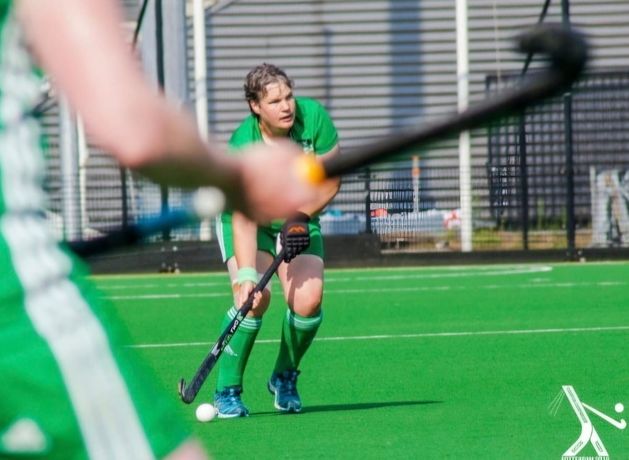50-year-old Emma Glanville explained to the Irish Independent she has loved hockey since she was first introduced to it in primary school.
“I started playing in national school when I was about eight, and I just loved it. It’s a tactical game and it’s a physical game, and great people are involved in it,” she said.
Emma is originally from Dublin but now lives in County Clare, where she works at the National Parks and Wildlife Service as a ranger, and she is involved in a number of sports and organisations, from being a scout leader to coaching mountain biking and supporting offshore kayaking.
But over the years nothing stopped her from playing hockey and this passion accompanied Emma for all her life.
In her younger years, she played for Leinster and for Connacht, and since her 40s she has been representing Ireland at the Masters Hockey competitions. Masters Hockey is comprised of a series of tournaments – including the World Cup – and players compete in five age groups from 35 to over 60 years old.
Emma said she feels extremely proud and privileged to be able to represent Ireland once again, this time at 50 years of age, and look forward to the Masters World Cup that will take place in New Zealand from November 7 to November 16.
Emma, who plays in centre defence, said: “I feel very privileged to still be able to actually run around the hockey pitch, and just honoured to be selected, a lot of people were running for the team. It’s a very proud moment when you’re told that you have made the squad and you’re going to be on the team.”
However, she said that accepting to be part of the team is not an easy choice for many players, as they need a lot of time and money.
Emma explained that not only has she to travel to Dublin every week for training, but there is no sports funding available for her age group, so she will also have to pay to travel to New Zealand with her own money.
“The questions are: can you afford it? New Zealand particularly is a long way away, so the money side comes into it. And can you afford the time off work as well? If you can do all of those, then you are in a very lucky position and you get to represent your country.
She added: “Most of the players in our squad have given a huge amount of time to hockey, everyone is involved and gives a huge amount back to the sport in general. And that is all done for free, it’s all volunteer work.
“We’ve people travelling to Dublin for training from all over the country, there’s people coming from Letterkenny, and there’s people coming from Kerry every Sunday to train in Dublin for the team. And that costs time and money.
“It’s difficult and some people have opted not to go because they couldn’t afford it. And that’s part of life, but it seems unfair to be chosen to represent your country and then you have to do all the fundraising and pay for everything yourself.”
In order to be able to go, Emma had set up a Go Fund Me page to help her represent Ireland at the upcoming World Cup.
“When you’re representing your country there should be some support from the country or from the national organisation. I know the national organisation doesn’t have a lot of money but no matter what age you are, you’re still representing your country.
“Certainly hockey as a sport is very underfunded, but I think there’s many sports in Ireland that are underfunded like that. If you’re not soccer, GAA or rugby it seems to be that there is very little support and funding,” she added.
Emma, who is also a passionate advocate for women in sport, has also talked about the importance of Masters Hockey for the new generations, showing that age is no barrier to achievement.
“I think it’s hugely important for younger people to see other men and women, particularly women, still playing the sport. The drop out rate for females is way too high.
“Some of my friends started playing Masters Hockey because they wanted their daughters see them playing and to be role models for their daughters to continue in sport and to enjoy it, whether they’re good or bad. It’s a positive influence.
“And it’s a massively important thing for young people to see older people still doing whatever sport they want to do, whether it’s swimming or GAA or hockey.
She added about her passion for hockey: “It’s a fantastic sport, it’s a real community. Same as most team sports, but you become part of something greater than just yourself. It’s a skilful game, it’s a physical game but not so physical that you’re going to do tackles like rugby, so it’s a game that you can keep doing and you can play it at any level.
“It doesn’t matter if you’re the world’s best or if you’re out to get some exercise and to enjoy playing a competitive game, there’s a team there and there’s a league there for you.
“It just shows what a great sport it is, by the fact that there is Masters Hockey. And that was started up by the players themselves, getting to an age where they were finding it hard to run around chasing after younger people, but they still had skills built up over the years and wanted to continue with the sport that they loved.”

